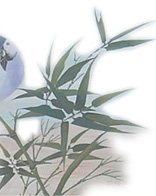|
 Listen to Shirley Singing the Poem Sep 8, 2007 Listen to Shirley Singing the Poem Sep 8, 2007
 Listen to Shirley to Read the Poem Dec,25,2005 Listen to Shirley to Read the Poem Dec,25,2005
 Shirley Created Picture for the Poem Shirley Created Picture for the Poem
 Shirley Written Chinese Calligraphy for It Shirley Written Chinese Calligraphy for It
 Learning the Meaning of the Poem Learning the Meaning of the Poem
 Autumn is a harvest season and it is a season to miss a family, a friend or a lover in the far away place. So, there are many Chinese poems to express this kind of feelings. Autumn is a harvest season and it is a season to miss a family, a friend or a lover in the far away place. So, there are many Chinese poems to express this kind of feelings.
In Chinese poetry theory, people thought a good poem, should have picture, music in it. I enjoy this poem by Tang Dynasty poet Du Mu, just for it has "painted out" a beautiful painting of landscape with a very simple language. Also, in this "picture", you can hear some music...
I had created a piece of music to match it on Dec, 2005. This week, I have also created a new painting and calligraphy to match it from the other angles and hope you enjoy them and be a little bit help to you learn this poem and to improve your Chinese level.
I have introduced some of peoms by Du Mu and you can review them by the links below:
Classical Poem - 0081 & Shirley Created Music-0071: Tomb-sweeping Day
Classical Poem - 023 & Shirley Created Music 0015: To Yangzhou Hanchuo Official
Shirley
Sun, September 9, 2007
---------------------
 Listen to Shirley Singing the Poem Sep 8, 2007 Listen to Shirley Singing the Poem Sep 8, 2007
 Listen to Shirley to Read the Poem Dec,25,2005 Listen to Shirley to Read the Poem Dec,25,2005
 Hi, friends, today, I would like to introduce a new Chinese classical poem Ji Yangzhou Hanchuo Panguanguan -- To Yangzhou Hanchuo Official by Tang Dynasty (816-907) Poet Du Mu (803 - 852). We have learned one of his poems -- Chinese Classical Poem --0017:Shan Xing -- Travel In A Mountain Do you remember it? Hi, friends, today, I would like to introduce a new Chinese classical poem Ji Yangzhou Hanchuo Panguanguan -- To Yangzhou Hanchuo Official by Tang Dynasty (816-907) Poet Du Mu (803 - 852). We have learned one of his poems -- Chinese Classical Poem --0017:Shan Xing -- Travel In A Mountain Do you remember it?
Du Mu (803-852) was one of the most important representative poets in the later period of Tang Dynasty(816-907). He was from a very rich family and he started to learn the classical Confucian theory from he was very young. He cared for the society progress and country's fate, wanted to help the poor poeple. But, his career was not very smooth. Except being a Ci Shi -- a feudal provincial or prefectural governor, he was a brainman most of his time, so, he spent much of his time on literature writing.
He made a high accomplishment on many things. Poetry is the most famous part -- especially on Jue Ju. He has a same reputation as Li Shangyin, to be called "Little Li Du" (The big “Li Du†is Li Ai and Du Fu) in Chinese poetry history. Now, there are about 450 poems and essays by him in the world.
I enjoy this poem for it makes me think of the beautiful view in the south of the Yangtze River that is my third hometown. :-)
As usual,I created a piece of music to match it and hope you enjoy it.:-)
Note: If you need help, please hit any Chinese word to see its Chinese pinyin, meaning, pronunciation and follow me to read them
MAIN MEANING OF THE POEM:
Blue mountains are indistinct,
clean rivers are flowing far away,
Autumn is ending,
grasses are still green in the South of Yangtze River.
Bright moonlight is shining over the Twenty-Four Bridge,
where are you teaching someone to blow the bamboo flute?
Accessories: Translation
Translation by Mr. Wang Dalian By Hundred Flowers Art Press.
Green mountains loom afar and streams off flow,
Falls gone but grass in South still well grow.
When moon shine on the Twenty-Four Bridge bright,
Where are you teaching flute-blowing tonight?
NEW WORDS:
Please hit any Chinese word that is new for you to see its Chinese pinyin, meaning, pronunciation and follow me to read them.
CHINESE CHARICTERS AND PRONUCIATION
 Listen to Shirley Singing the Poem Sep 8, 2007 Listen to Shirley Singing the Poem Sep 8, 2007
 Listen to Shirley to Read the Poem Dec,25,2005 Listen to Shirley to Read the Poem Dec,25,2005
ه¯„و‰¬ه·éں©ç»°هˆ¤ه®ک--Ji Yangzhou Haichuo Paiguang
وœç‰§ -- Du Mu
é’ه±±éڑگéڑگو°´è؟¢è؟¢--qؤ«ngshؤپn yاگnyاگn shuاگ tiأ،otiأ،o,
秋ه°½و±ںهچ—èچ‰وœھه‡‹--qؤ«ujأ¬n jiؤپngnأ،n cاژo wأ¨i diؤپoم€‚
ن؛Œهچپه››و،¥وکژوœˆه¤œ--ؤ›rshأsأ¬ qiأ،o mأngyuأ¨ yأ¨ï¼Œ
çژ‰ن؛؛ن½•ه¤„و•™هگ¹ç®«--yأ¹rأ©n hأ©chأ¹ jiأ o chuؤ«xiؤپoم€‚
That's all for this poem. Hope you enjoy it. :-)
 Note: If you need help, please hit any Chinese word to see its Chinese pinyin, meaning, pronunciation and follow me to read them Note: If you need help, please hit any Chinese word to see its Chinese pinyin, meaning, pronunciation and follow me to read them
If you have any questions, comments and suggestions, please write to shirley@ebridge.cn , or shirleyz004@yahoo.com, You are welcomed.
Shirley Zhang
Written,Edited and Recorded on Sun, Dec 25, 2005
Re-Eddited on Sun, Sep, 9, 2007
|

